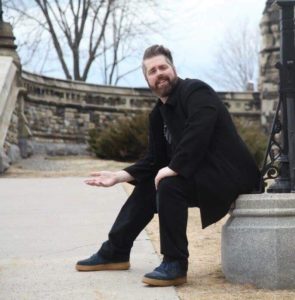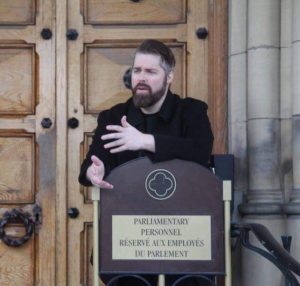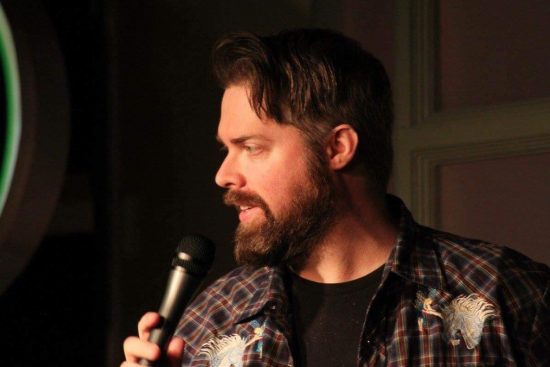For years I’ve been surprised and impressed by Jay Whitecotton. It seems there isn’t anything he can’t do. I’ve read prose-like posts, seen amazing sets, watched him open a live podcast on piano, and as we prepared to start this interview, he picked up my guitar and started to play.
Born in Austin, but raised in San Antonio, Whitecotton initially grew up in a poor neighborhood. Around the age of ten his family moved to a more affluent neighborhood, but Whitecotton still got the sense that they stood out as “the creepy house.”
Growing up to parents that were highly educated but struggled with addiction and mental illness, Whitecotton had to learn to be resourceful and self-sufficient at an early age. Being locked in his room for a summer while his parents got high, you can imagine what a creative, yet shy personality that might foster. It also seemed to make Whitecotton a pragmatist, developing keen sense of self-preservation and survival.
Comedy, ever the wonderful escape, Whitecotton recalls some of his early childhood introduction, playing a VHS of Robin Williams Live at The Met and falling asleep, ironically, to Bill Cosby’s Himself. After his parent’s divorce, his father listened to Sam Kinison Louder Than Hell, which appealed to him as a child. He enjoyed Kinison’s constant yelling.
Resourceful as ever, Whitecotton was attending a private school on scholarship, running a gambling racket in the school to earn cash off the rich kids. Some of the money he earned as the amateur school “bookie”, would go to buy more comedy albums.
 Around the age of 18, Whitecotton’s father took his college money and proceeded to throw him out of the house. Having very little possessions, one being a guitar, he taught himself to play out of necessity. Growing up around drugs taught him to stay away from them until he got his life in order. Having seen the negative impact on his parents and being exposed to them at such an early age, drugs lost their mystique, taboo, and appeal.
Around the age of 18, Whitecotton’s father took his college money and proceeded to throw him out of the house. Having very little possessions, one being a guitar, he taught himself to play out of necessity. Growing up around drugs taught him to stay away from them until he got his life in order. Having seen the negative impact on his parents and being exposed to them at such an early age, drugs lost their mystique, taboo, and appeal.
Each time Whitecotton tried to seek higher education it would lead to a series of unfortunate events, including breakups, car trouble, and ultimately an arrest for an outstanding warrant he was unaware he had. Finally, Whitecotton vowed he would not seek a degree, if he could just get out of the rut of misfortunes.
Whitecotton found himself miserable, working as a DJ for bar karaōke. He would put his own humorous spin on the show, roasting singers and telling jokes just to keep his sanity. The karaōke nights he hosted became infamous. Soon he was urged to pursue his gift of riff and take a workshop. He eventually agreed to the workshop, because he knew if he paid for it he would commit to it.
Initially his sets were half “high-construct” political humor, and half incredibly offensive material that would play great to a bar but not to a comedy club. Whitecotton recalls the style was based in insecurity, and outgrew it as he gained experience. The San Antonio scene offered him a decent amount of stage time to develop his act as a long-form comic, but, realizing that he would need to adapt to more short form if he wanted to make the jump to New York or Los Angeles, he set his sights on Austin. Whitecotton learned to adapt his sets from the alt scene to the club as he gained experience in Austin.
In comedy and in life, Whitecotton seems to keep to three fundamental rules:
- Don’t bullshit yourself
Don’t take yourself too seriously
Allow yourself to suck
These seem to have served him well, as Whitecotton has had success as a touring comic, compiled a long list of festivals under his belt, and released two albums, Hi, Lonesome (2016) and Monster Ballads (2018). Whitecotton’s style has developed into a form of comedy that makes the audience think, question their perspective, and laugh at controversial subjects with his flair for ingenious analogies. Laughing in the face of having one’s ideas challenged…the world could use a lot more of that right now, don’t you think?

